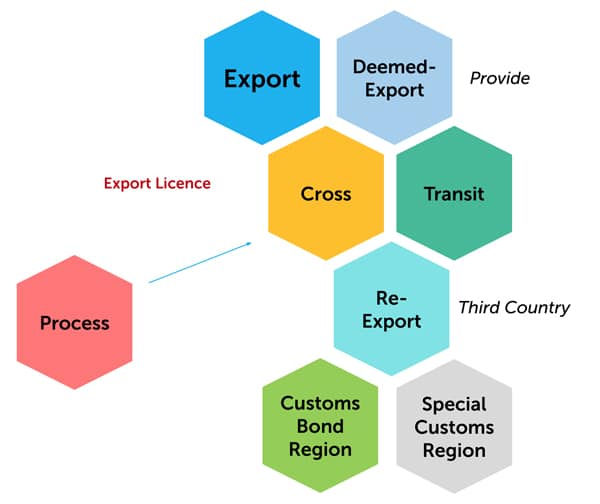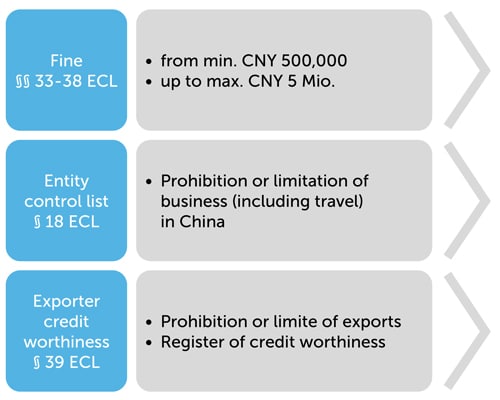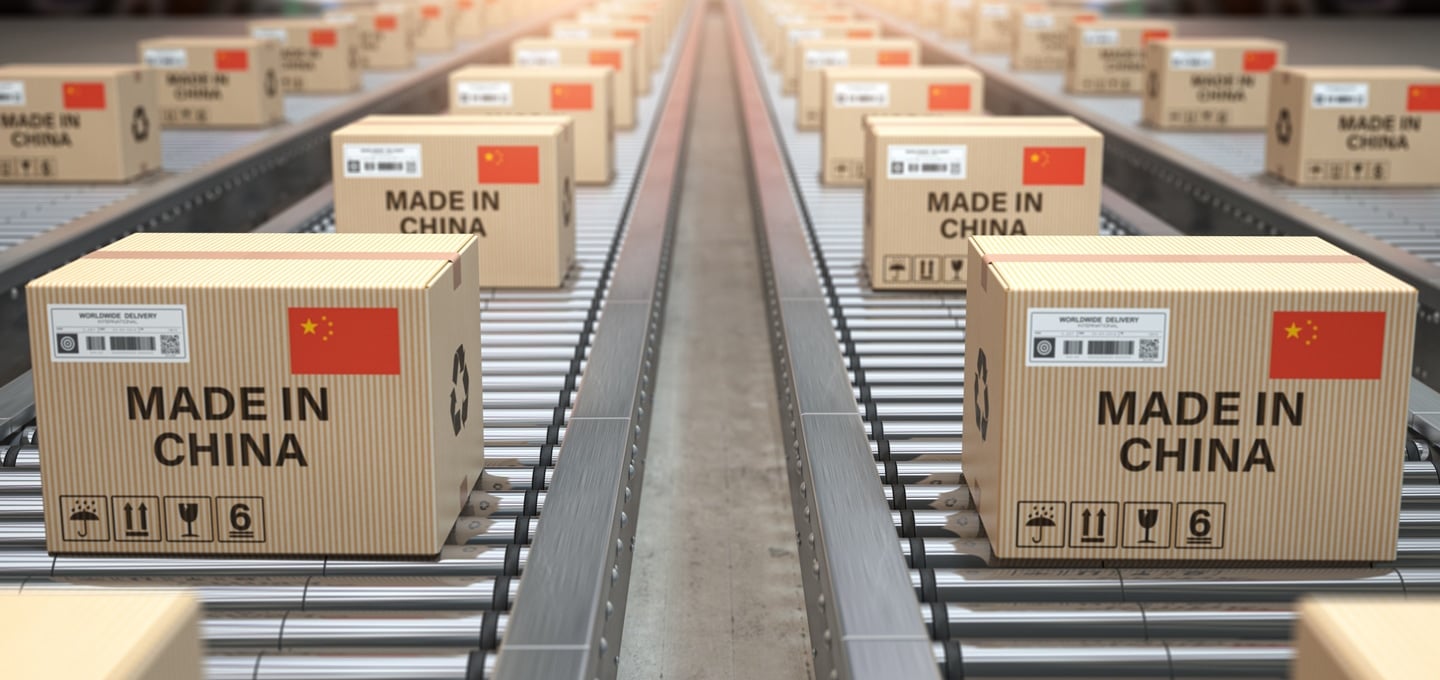1. Background
Due to the increasingly fierce competition in international trade, “export control” is now a hot topic worldwide. Export control is the laws and regulations formulated by the state for security, economic, military and foreign policy reasons to prohibit or restrict the export of a particular good in order to control the object or use of that good. Export control is an international obligation of states and also a common international practice.
As one of the largest exporting countries, the Chinese government wants to regulate exports more closely by law. Previously, the legal basis for China’s export control system was mainly the Foreign Trade Law and the Customs Law. There was no separate law dealing specifically with export control. The Export Control Law, which consists of five chapters and 49 paragraphs, creates a comprehensive legal framework for regulating export activities from China.
2. Scope of application
The transfer (including re-export) of controlled goods from China to foreign countries, as well as the provision of controlled goods by natural or legal persons or unincorporated organisations to foreign natural or legal persons, is regulated by this Law.
Controlled goods
According to Section 2 of China’s Export Control Law, this law applies to the state export control of dual-use goods, military goods, nuclear goods, and other goods, technologies and services.
| Controlled goods (§ 2 ECL) | Description |
|---|---|
| 1. Dual-use goods | Goods, technologies and services that have both civilian and military applications or that contribute to enhancing military potential, in particular those used for the design, development, production or use of weapons of mass destruction and their means of delivery. List of dual-use goods |
| 2. military goods | are equipment, specialised production facilities and other related goods, technologies and services used for military purposes. |
| 3. Nuclear goods | nuclear materials, nuclear equipment, non-nuclear materials for reactors and related technologies and services. |
| 4. other goods, technologies, and services | related to the maintenance of national security and interests and the fulfilment of anti-proliferation and other international obligations. |
Controlled export operations
According to Section 2 (3) of the Export Control Law, export control refers to the prohibition or restrictive measures taken by the state for the transfer of controlled goods from the Mainland of the People’s Republic of China to outside the Mainland. This also includes the provision of controlled goods (deemed export). The law has in mind the provision by natural persons, legal entities or organisations of the People’s Republic of China to foreign persons and organisations. The export operations regulated by Section 45 of the Export Control Law are export, transit, re-export (to third countries) and export of goods from a bonded area or a special customs zone. This means that all of the above export operations require a corresponding export licence from the competent authority.

End-Use & End-User
The intended end-use of the controlled goods as well as their end-user must be taken into account. According to Section 15 of the ECL, exporters must provide the Chinese State Export Control Administration with documents proving the end-user and end-use of the controlled goods. These proof documents must be issued by the relevant government agency abroad in accordance with Section 15 of the ECL.
In the event of a change of end-use or end-user, the exporter and importer are obliged to report to the Chinese export control authority in accordance with Section 16 of the ECL.
Extraterritorial legal effects
Section 44 of the ECL regulates the territorial scope of this Act also for foreign countries. This means that natural persons or legal entities from abroad also fall under the scope of application of the ECL. If they violate the law and thereby endanger the national security and interests of the PRC or obstruct the fulfilment of its anti-proliferation and other international obligations, they can then also be sanctioned under Section 44 of the ECL. Such violations include, for example, the export of controlled goods from China to a third country by an importer in Germany without a licence from the Chinese export control authority.
However, the specific types of violations as well as the corresponding sanction measures are not regulated in more detail in the law. How the law will be implemented in practice is a very exciting question that remains to be seen.
3. Administrative sanctions
Fine and export ban
If the controlled goods are exported without authorisation from the control authority, the exporters may be fined a minimum of CNY 500.00 to a maximum of CNY 5 million in accordance with sections 33-38 of the ECL.
In addition, according to Section 39 (1) of the ECL, an exporter who has been penalised may no longer obtain an export licence for a period of five years. Responsible persons and other relevant persons may be prohibited from engaging in the relevant export business for this period.
Entity control list
Importers and end-users to whom any of the following circumstances apply may be placed on a control list in accordance with Section 18 of the ECL.
- Breach of end-user or end-use requirements
- endanger national security and interests
- Use of controlled goods for terrorist purposes
Importers and end-users listed on the control list have the option of applying to the State Export Control Administration for removal from the control list after taking measures to eliminate risks.

Credit record
Pursuant to section 39 (2) of the ECL, the State Export Control Authority may record violations of this Act in the creditworthiness register of export enterprises.
4. Criminal sanctions
Section 43 of the ECL stipulates that companies that violate the regulations of the Export Control Act, especially if they export state-prohibited goods or controlled goods without a licence, are subject to criminal prosecution. These include the offence of smuggling, illegal business activity, disclosure of state secrets, falsification of licence, etc. Such offences result in a custodial sentence as well as a fine. It should be noted that both a permanent export ban and a permanent import ban may be imposed as a criminal sanction.
5. Implications for European companies
The European companies that directly or indirectly purchase from Chinese companies through suppliers, as well as supply chains with European companies that produce in China through subsidiaries, fall under the scope of the ECL. In the event of violations of the provisions of the ECL, these affected European companies can be sanctioned equally regardless of their location (in or outside China).
6. Key compliance recommendations from the Chinese Ministry of Commerce
Internal Compliance Programme
Since strict sanctions are imposed in the event of violations, compliance with the provisions of the ECL is of paramount importance for companies. According to the guidelines of the Chinese Ministry of Commerce (MOFCOM) on the establishment of an internal compliance programme for the export control of dual-use goods (as of 28.04.2021), an internal compliance programme should be introduced in the company. In MOFCOM’s view, the compliance programme is an essential part of the management system. Although the guidelines are not binding, the establishment of an internal compliance programme makes sense for companies.
In addition, the exporter with an effective internal compliance programme may be granted “facilitation measures”, the so-called “General Licence”, to comply with the provisions of Section 14 of the ECL.
Risk assessment from the business partner
In addition, MOFCOM recommends companies to conduct a comprehensive risk assessment of business partners. According to the results of the risk assessment, companies can establish and improve internal export control compliance programmes and related organisational management systems to implement the possible risk prevention measures.
Whistleblowing, internal investigation
In order to detect compliance risks in a timely manner, MOFCOM further recommends that companies establish internal whistleblowing reporting channels. In addition, internal investigations should be conducted in suspicious cases. Depending on the outcome of the internal investigations, companies can implement appropriate measures or report the suspected cases to the competent authority.
Training
Regular training for joint staff on the current legal situation of export control is very useful in MOFCOM’s view. Up-to-date legal knowledge of employees can prevent potential violations of relevant regulations.
Documentation
Exporting companies should fully document the complete process of exporting, including the previous export record, communication with the competent authorities, customer information and correspondence, licence application documents, licensing documents and the status of export implementation.
External professional support
Ultimately, it would be helpful for companies to be informed of the legal situation in good time. With the help of external support from experts and specialised lawyers, companies can obtain a better overview of the current legal situation. In addition, through external support, an effective compliance programme can be set up in companies and compliance training can be conducted. This minimises the risk of violations of export control regulations.
Do you have questions about implementing the new Chinese Export Control Law in your company? Feel free to contact us!



